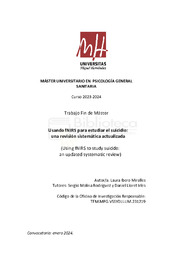Título :
Usando fNIRS para estudiar el suicidio:
una revisión sistemática actualizada |
Autor :
Ibero Miralles, Laura |
Tutor:
Molina-Rodríguez, Sergio
Lloret Irles, Daniel  |
Editor :
Universidad Miguel Hérnández de Elche |
Departamento:
Departamentos de la UMH::Psicología de la Salud |
Fecha de publicación:
2024-01 |
URI :
https://hdl.handle.net/11000/33731 |
Resumen :
Introducción: El suicidio causa cientos de miles de muerte al año, y frecuentemente el riesgo de suicidio no es detectado a tiempo debido a las limitaciones de los métodos de evaluación existentes. Actualmente se están investigando métodos más objetivos, con el fin de intentar predecirlo. Una línea de investigación relativamente nueva utiliza fNIRS (espectroscopía funcional de infrarrojo cercano) como alternativa portable y barata a la resonancia magnética funcional Objetivo: Recopilar los estudios disponibles que utilicen fNIRS para estudiar el suicidio, con el fin de actualizar la revisión existente y conocer el estado actual de este campo de investigación. Metodología: Revisión sistemática siguiendo el método PRISMA, llevando a cabo una búsqueda sin filtros en las bases de datos Scopus, Pubmed, ‘Web of Science’, EBSCOhost, Embase y ‘ProQUEST Central’. La calidad de los estudios fue revisada utilizando la escala Newcastle-Ottawa. Resultados: Un total de 16 estudios fueron incluidos en esta revisión, todos con una calidad aceptable. Los diferentes estudios reflejan que han encontrado diferencias en los patrones de actividad cerebral entre personas con y sin sintomatología suicida. Discusión: A pesar de que los resultados no sean concluyentes, esta revisión recopila información valiosa para orientar el diseño de futuros estudios.
Introduction: Suicide causes hundreds of thousands of deaths every year, and its risk is often under-detected due to the limitations of the existing assessment tools. In order to be able predict suicide, new and more objective assessment methods are being studied. A relatively new field uses fNIRS (functional near infrared spectroscopy) as a portable and inexpensive alternative to functional magnetic resonance. Objective: To collect existing studies that use fNIRS to study suicide, in order to actualise the existing review and know the current state of the field. Methodology: Systematic review following PRISMA guidelines, conducting a search with no filters in Scopus, Pubmed, ‘Web of Science’, EBSCOhost, Embase y ‘ProQUEST Central’ databases. Quality of evidence was assessed using the Newcastle-Ottawa scale. Results: A total of 16 studies were included in this review, all of which has acceptable quality. The studies show that differences in patterns of cerebral activation have been found between subjects with and without suicidal symptomatology. Discussion: Despite results not being conclusive, this review collects valuable information to direct the design of future studies.
|
Palabras clave/Materias:
suicidio
autolesión
espectroscopía de infrarrojo cercano
fNIRS
prevención
detección
cambios hemodinámicos |
Área de conocimiento :
CDU: Filosofía y psicología: Psicología |
Tipo de documento :
info:eu-repo/semantics/masterThesis |
Derechos de acceso:
info:eu-repo/semantics/openAccess
Attribution-NonCommercial-NoDerivatives 4.0 Internacional |
Aparece en las colecciones:
TFM- M.U en Psicología General Sanitaria
|
 La licencia se describe como: Atribución-NonComercial-NoDerivada 4.0 Internacional.
La licencia se describe como: Atribución-NonComercial-NoDerivada 4.0 Internacional.
.png)
